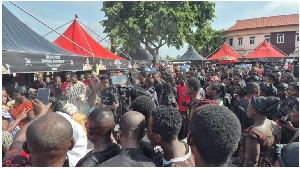Business News of Thursday, 5 June 2025
Source: www.ghanawebbers.com
Energy Sector Levy raised GH¢9bn but power crisis persists – AOMCs CEO
The CEO of the Association of Oil Marketing Companies (AOMCs) has raised concerns. He questioned the impact of the Energy Sector Levy Act (ESLA). This follows Parliament's approval of a new GH¢1 levy on petroleum products.
Dr. Riverson Oppong spoke on Joy News’ PM Express with Evans Mensah. He expressed frustration over the lack of transparency and results from the existing levy. He warned that adding costs to fuel prices won't solve Ghana’s power crisis.
“Last year, ESLA raised no less than GH¢9 billion,” he revealed. “Where did that money go?”
Dr. Oppong noted that the electricity sector relies on levies like ESLA for support. However, he believes poor financial management is the core issue, not a revenue shortage.
“It’s not about increasing ESLA or adding another GH¢1,” he stressed. “We need to understand what the exact problem is.”
He used an analogy: “Building a storey building on a soft foundation will cause a collapse.”
The new GH¢1 energy levy was approved by Parliament on June 3. It aims to raise revenue to clear legacy debts in the energy sector and ensure stable power supply.
Critics, including civil society groups and consumer advocates, argue it will raise living costs without ending power cuts.
Dr. Oppong supports helping the energy sector but insists on clear outcomes and transparency. He emphasized structural reform is necessary.
“The Energy Sector Recovery Programme (ESRP) was enacted to solve this problem,” he noted. “Yet we still discuss how to avoid future issues.”
He highlighted the human cost of ongoing power outages in Ghana. Many households and small businesses have limited alternatives during blackouts.
“If you are an ordinary Ghanaian with no power at night, it’s painful,” he said.
“Even for the government, having ‘dumsor’ at night isn’t pleasant.”











